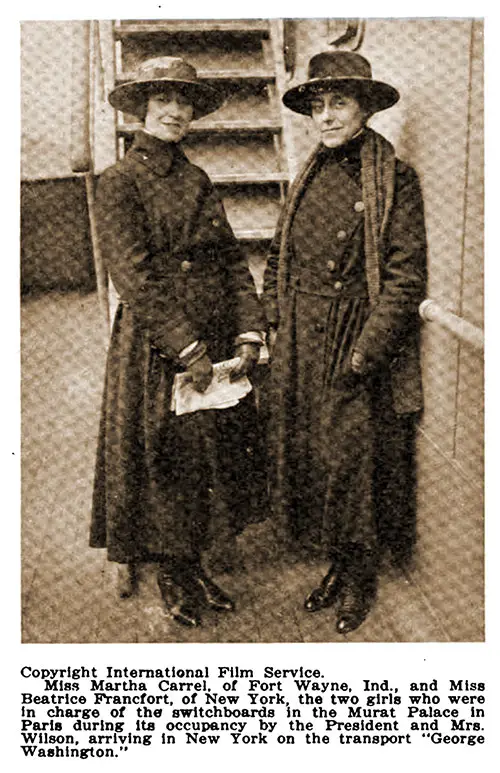The Signal Corps Girls “Made Good" - 1919
General Russel, Chief Signal Officer of the A. E. F., Compliments Them on the Part They Played in the Great Victory

Miss Martha Cairel, of Fort Wayne, Ind., and Miss Beatrice Francfort, of New York, the Two Girls Who Were in Charge of the Switchboards in the Murat Palace in Paris during Its Occupancy by the President and Mrs. Wilson, Arriving in New York on the Transport “George Washington.” Photograph © International Film Service. Bell Telephone News, April 1919. GGA Image ID # 19a6d460b8
To the Signal Corps Girls of the American Army have been awarded many honors', and to them has been given the credit of an unparalleled service that had its ultimation in helping to win the great war. And for America these brave girls have scored another triumph—proving the versatility of our women and their bravery and usefulness when great need comes.
In the beginning of the American part in the World War it was rumored throughout France that American women were not desired nor wanted as a part of the American army and that they would be more of a nuisance than a help.
This may and may not have been true. It might have been, too, the old prejudice that war is not a feminine gathering, but rather a hard cold fact that belongs exclusively to men. If so, the present war has rather dissolved this.
Women have served the American army in every possible relation, given every possible assistance, save that of carrying a gun and living in the trenches.
That they have lived just outside of the trenches and been under shell fire hourly is a known fact, and the women who have been the nearest to the army, a very part of it, are the ones who have won the highest compliments from the commanding generals and the fighting privates.
Last summer during June and July when Paris was threatened by the big, camouflaged guns of the Huns and thousands of our own American men and boys were massed between this beautiful city and the enemy, it was the three score telephone girls working at the switchboards of this suddenly advanced army zone who are said now to have saved Paris in the second battle of the Marne.
They acquired a reputation second only to General Gallient’s taxicab army which saved the capital in the first battle of the Marne.
Now that the armistice is signed, and the world peace negotiations are under way the army has had time to take stock of its human material and in the review has paid a high compliment to the service of these telephone girls—young girls for the most part, slender young things, who look all the more slender and young in the dark blue uniforms and the compact service cap over their oftentimes short cut locks.
A letter has been addressed to these girls, signed by the Brigadier General of the Chief Signal Office. This letter reads as follows:
To the Members of the Telephone Operating Unit Signal Corps, A. E. F.:
1. On the occasion of the going into effect of the armistice with the enemy. I desire to avail myself of the opportunity to express to you the satisfaction with which I and the officers associated with me have observed the quality of your work in these past months and to congratulate you on the large part you have had in our glorious victory.
2. The bringing of women telephone operators to France for service with the American Expeditionary Forces had no precedent. and for this reason the experiment was watched with unusual interest. It pleases me a great deal to say that by your ability, efficiency, devotions to duty and the irreproachable and businesslike conduct of your affairs, personal and official, you have not only justified the action taken in assembling you but have set a standard of excellence which could hardly be improved upon and which has been responsible in no small measure for the success of our system of local and long distance telephone communication.
3. While this has seemed to be the fitting occasion to express appreciation of your work in the trying period just ended, it will no doubt be some time before the telephone business over our system shows any signs of decreasing. It is not questioned that the brilliant reputation your unit has established for itself will be maintained to the end and that you will continue individually and collectively to maintain the high standard of service you have already set.
E. Russel, Brigadier-General, C. S. O.
“The Signal Corps Made Good: General Russel, Chief Signal Officer of the AEF, Compliments Them on the Part They Played in the Great Victory,” in Bell Telephone News, Detroit Edition, Vol. 8, No. 9, April 1919, p. 19.
